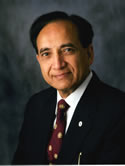Craniofacial resection for cranial base malignancies involving the infratemporal fossa Journal Article
| Authors: | Bilsky, M. H.; Bentz, B.; Vitaz, T.; Shah, J.; Kraus, D. |
| Article Title: | Craniofacial resection for cranial base malignancies involving the infratemporal fossa |
| Abstract: | OBJECTIVE: Cranial base malignancies involving the infratemporal fossa have been considered unresectable. Advanced operative techniques have made tumor resection feasible in an en bloc fashion with negative histological margins, but there are limited data regarding outcome analysis in patients who have undergone resection of malignant tumors in this area. METHODS: At Memorial Sloan-Kettering Cancer Center, 25 patients underwent anterolateral cranial base resections for tumors that involved the infratemporal fossa during a 7-year period. The most common tumors were sarcoma (n = 9), squamous cell carcinoma (n = 6), and adenoid cystic carcinoma (n = 3). The median size of the tumors was 6 cm, and 12 tumors involved the anterior cranial base and/or orbit. Tumor resections were divided into three types. Twelve patients underwent Type 1 dissection for tumors involving only the infratemporal fossa and maxillary sinus; 2 patients underwent Type 2 dissections involving the infratemporal fossa and anterior cranial base; and 11 patients underwent Type 3 dissection, which included the infratemporal fossa, anterior cranial base, and orbit. All patients required free flap reconstruction, 22 of which were rectus abdominis free flaps. RESULTS: Complications occurred in seven patients, including a single mortality resulting from a myocardial infarction. The 2-, 3-, and 5-year survival rates were 69, 63, and 56%, respectively. The relapse-free survival rates were 47% at 2 and 3 years and 41 % at 5 years. Recurrences were local in nine patients and distant in four patients. CONCLUSION: Despite the extensive nature of many infratemporal fossa tumors, they can be resected with acceptable morbidity. Survival rates approach those of anterior cranial base malignancies without infratemporal fossa involvement. |
| Keywords: | adult; cancer survival; clinical article; treatment outcome; aged; aged, 80 and over; middle aged; survival analysis; cancer surgery; retrospective studies; mortality; cancer recurrence; squamous cell carcinoma; follow-up studies; tumor volume; time factors; sarcoma; postoperative complication; cancer center; meningeal neoplasms; heart infarction; craniotomy; skull base; skull base neoplasms; adenoid cystic carcinoma; free tissue graft; craniofacial surgery; skull base tumor; cranial fossa, anterior; rectus abdominis muscle; orbit; maxillary sinus; anterior skull base; middle cranial fossa; infratemporal fossa; cranial base tumors; muscle graft; frontal sinus |
| Journal Title: | Neurosurgery |
| Volume: | 57 |
| Issue: | 4 Suppl. |
| ISSN: | 0148-396X |
| Publisher: | Wolters Kluwer |
| Date Published: | 2005-10-01 |
| Start Page: | ONS |
| End Page: | 339 |
| Language: | English |
| DOI: | 10.1227/01.neu.0000176648.06547.15 |
| PUBMED: | 16234683 |
| PROVIDER: | scopus |
| PMCID: | PMC1858642 |
| DOI/URL: | |
| Notes: | --- - "Cited By (since 1996): 6" - "Export Date: 24 October 2012" - "CODEN: NRSRD" - "Source: Scopus" |
Altmetric
Citation Impact
BMJ Impact Analytics
Related MSK Work






